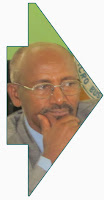 |
| Making it clear: Mr. Chandra Bhushan (middle) answering to questions raised by audience members during Wangari Maathai Day special 5th Wangari Maathai Memorial Lecture at Ambo campus of Micro Business College on 17 March. Also seen are President of the college, Mr. Abera Tilahun (L) and Vice Dean, Mr. Megersa Nuresa. PHOTO: TESHALE CHALUMA, MICRO BUSINESS COLLEGE. |
Wangari Maathai Day special 5th Wangari Maathai Memorial lecture was followed by an active interaction. Audience asked questions on diverse aspects to the speaker, Mr. Chandra Bhushan who provided convincing replies. The question-answer session could be in brief, sketched as below:
 |
| Prof. M.I. Zuberi |
Change from large scale manufacturing to small scale production. Is it really possible?
Action is better than futile discussions. 250gm of fossil fuel and half litre of water are needed for making a water bottle. 2.5kg of wood and 100 litres of water are required for producing 1kg of paper. A student getting 20 percent is disqualified; but we accept vehicles that have just 20 percent fuel efficiency. [...]
 |
| Dr. Akhila S. Nair |
Aspects encompassed in the Gross National Happiness Index of Bhutan?
50-60 indicators are there in the GNH index. These include certain important aspects like Health, Food, Education and even Leisure. Also it prompts the country to attain equality. In egalitarian societies, there is no place for poverty. [...]
 |
| Ms. Deepsikha Saikia |
More service and less product. How is it possible? Happiness, can it be rightly defined?
Service industry is more efficient than the product industry. We need more talk time not phones; shelter, not many houses. Happiness may be abstract, but we know certain common reasons all over the world for unhappiness. Hence our effort should be to eliminate reasons of unbapiness. [...]
 |
| Mr. Ananya Tesfaye |
Rich countries have a major place in causing global warming. Cant’ they contribute to control it, too?
In unequal societies, some would get more opportunities; and a section of people would always get sidelined. Coming is the Paris Conference. We are hopeful of using that as a platform for convincing rich countries to help poor coountries. [...]
 |
| Mr. Abisa |
Certain countries cause technological pollution; there is also cultural pollution.
After 1980s, there is an export boom. Ethiopia exports teff, but it can cause domestic scarcity. All over Africa, land is given for commercial farming and export. Large scale farming won’t build capacity. Machines won’t give jobs, too. I don’t believe in technological or cultural pollution. To me, every culture is good. [...]
 |
| Mr. Kanna Woyesa |
Greedy countries, governments and individuals. How to briddle this greedy race?
Certain emulative models are available. Scandinavia, for example, imposes 60 percent tax over the wealthy people and pools that for supporting the poor. Man after all, is a greedy species. I appreciate the idea of socialist capitalist society. Collect from those having too much and give it for those don’t have [...]
 |
| Mr. Behaynu Addisu |
Our country is taking certain measures by 2025. We are committed to make use of our resources.
Ethiopia is a country with vast resources, splendorous nature and salubrious climate.
Tragedy of African nations is that the poorest people live in the richest land. Important are capacity building and good governance. Singapore showed it in 50 years. We have the oldest wisdom. Should’nt follow the US and the Europe [...]
 |
| Mr. Melaku Etefa |
Is there any legislation to prevent the developing world from contaminating this planet?
Of course, there are international conventions and forums to rectify and stop mistakes. International court is also set up. The world still revolves in such a way that the might is always the right.
[...]






































